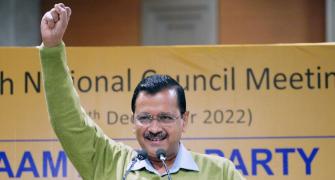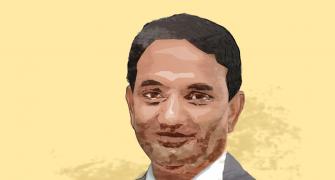The facts are startling.
Out of the 100 crore people in India, 70 crore are above the age of 20. Out of the 21 crore urban population, 2.52 crore have diabetes but 8.4 million are undiagnosed.
About 12 to 15 percent of the urban population above the age of 20 has diabetes but it remains undiagnosed.
Out of a population of 49 crore in rural India, 9.8 million have diabetes but 4.9 million are undiagnosed. That is, about 2 to 6 percent of the rural population is diabetic.
But 30 percent of the diabetics in urban India and 60 percent of those suffering from diabetes in rural India are undiagnosed.
On the whole, out of a total of 3.5 crore diabetics in India, 1.33 crore go undiagnosed. The result is complications at a later stage.
Alarmed by these statistics world-renowned diabetic specialist Dr A Ramachandran of the MV Diabetic Centre and his team did a study on diabetes in India and identified the undiagnosed diabetics without unnecessarily testing all the people concerned.
The Diabetes Risk Score
That is where the Diabetes Risk Score plays a role. It is based on simple measurements to identify people with undiagnosed diabetes. These risk scores have been developed in Cambridge University, UK and Denmark, and are used only in the white (Caucasian) European populations.
"It was believed that this may not be suitable for Indians. Therefore, we decided to undertake a study to develop and validate a simple diabetes risk score in an urban Indian population. We also tested whether this score was applicable to South Asian migrants living in a different cultural context," said Dr Ramachandran.
Indian Diabetes Risk Score
The Diabetes Research Centre of the MV Diabetic Centre, Royapuram, Chennai, in collaboration with Cambridge and the University of Sydney, Australia, developed an Indian Diabetes Risk Score.
Dr Ramachandran and his team took data from a national survey sample of approximately 10,000 subjects, which included people from Chennai, Bangalore, New Delhi, Mumbai, Kolakata and Hyderabad. The sample was divided into two parts of 5,000 each.
They applied the Diabetes Risk Score on them, and found that age, body mass index, waist size, family history of diabetes and sedentary lifestyle, or no physical activity are significant risk factors.
The score was validated by applying to a population sample of 5,000 where the survey was conducted. The score was applied to a second sample of 5,000 in the same national sample and again found to be valid. It was then validated for a separate Chennai sample from a previous survey done in 1995.
The score developed in India has low sensitivity for Indians in the UK, and is also not applicable to the white population in the UK.
The use of risk score and advantages
The advantages of using Diabetic Risk Score to identify diabetes is that it saves costs to apply the score and simple measurements are used. Second, unnecessary testing of people who do not have the risk of diabetes can be avoided. "Therefore this can be used on a national scale in clinics all over India."
Needless to say, it will be a boon to the millions of people in India who are under risk.








